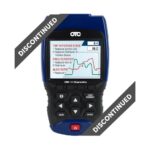Navigating car diagnostics can be complex, but for Saturn owners, especially those active in online communities like Saturn forums, having the right OBD scanner is essential. Understanding the difference between basic code readers and comprehensive scanners is the first step to effectively troubleshooting your vehicle. This guide will delve into what constitutes the best OBD scanner for Saturns, ensuring you get the most out of your diagnostic tool and can confidently participate in forum discussions.
It’s crucial to distinguish between a simple code reader and a full-fledged code scanner. A code reader typically only accesses powertrain (P) codes, which are the standardized codes that trigger the check engine light. A true code scanner, however, goes much further. It can read codes from various vehicle systems, including:
- B = Body Codes: Related to the Body Control Module (BCM), managing systems like power windows, door locks, and interior lighting.
- C = Chassis Codes: Often associated with the braking and stability systems, including the Anti-lock Braking System (ABS) and airbag (SRS) systems.
- U = Communication Codes: These codes indicate communication issues between different modules within the vehicle’s network.
Beyond these generic OBD2 codes, manufacturers like Saturn also implement their own set of enhanced, manufacturer-specific codes. For instance, a B-code might be universally defined to a certain extent, but Saturn’s specific B-codes will pinpoint issues unique to Saturn vehicles. Accessing these manufacturer-specific codes often requires a more advanced scanner, typically at a higher price point. While generic P-codes can turn off the service engine soon light, they often miss underlying issues in other systems that manufacturer-specific codes can reveal. You could have numerous body codes present without any warning lights, only discoverable by a scanner capable of reading them. While older Saturn models like a ’98 SC2 might not have a Body Control Module, newer models and other vehicles greatly benefit from scanners that can access these broader code categories.
Alt text: A mechanic uses a handheld OBD2 scanner to diagnose a car engine, highlighting the importance of diagnostic tools in modern vehicle repair.
Full-featured scanners become particularly valuable when dealing with warning lights related to the ABS or SRS airbag systems. Instead of vague warnings, these scanners can provide specific fault codes, often chassis codes, that pinpoint the exact sensor or component malfunctioning. For example, a scanner might identify a faulty impact sensor, saving you the guesswork and expense of replacing multiple parts in a trial-and-error approach. This level of detail is why professional mechanics invest in sophisticated diagnostic tools capable of communicating with various vehicle modules across a wide range of makes and models. These professional-grade systems can interpret generic OBD2 language and delve into manufacturer-specific codes, offering a comprehensive diagnostic capability.
By standardization, OBD2 codes have fixed definitions for certain sections within the P, B, C, and U code ranges. This ensures a degree of consistency across all vehicles for common issues. However, the real diagnostic depth lies within the manufacturer-specific codes, where each automaker can define codes tailored to their unique vehicle systems and potential problems.
Beyond simply reading codes, consider an OBD scanner that offers real-time data display. Modern scanners with this capability are increasingly affordable and immensely helpful. The value of real-time data varies depending on your vehicle. High-end tools like a GM Tech 2 are designed to access a vast amount of real-time data parameters specific to GM vehicles, far beyond the reach of basic scanners. While most scanners can display fundamental real-time data like air-to-fuel ratio, RPM, and oxygen sensor voltage from the Powertrain Control Module (PCM), accessing more specialized data requires more advanced equipment. For older vehicles, especially pre-2000s Saturn models, the availability of extensive real-time data through newer scanners might be limited. Manufacturers often prioritize developing comprehensive data access for newer vehicles.
Therefore, for Saturn owners active in forums and interested in DIY diagnostics, a recommended approach is to acquire a reasonably full-featured scanner. It should, at minimum, read generic OBD2 codes and, ideally, also access manufacturer-specific codes for your Saturn year model without being excessively expensive. While advanced Bluetooth-based scanners with excellent manufacturer-enhanced code software are available, they might not always provide extensive real-time data or even static information for older OBD2 vehicles like 1998 or 1997 Saturn SC2s. For these older cars, a slightly older, used, or refurbished scanner specifically known to fully interrogate the PCM for additional data can be a worthwhile investment.
While accessing every possible data point is theoretically advantageous, it’s generally unnecessary unless you are a professional mechanic specializing in older OBD2 Saturns. For the average Saturn owner and forum user, having enhanced manufacturer code support is beneficial but not strictly essential for basic diagnostics, especially on simpler, pre-BCM Saturn models of the mid-90s. However, if you own multiple GM vehicles, particularly newer ones, enhanced GM manufacturer-defined code support becomes significantly more valuable due to the increased complexity of their systems and the integration of Body Control Modules.
In conclusion, choosing the “Best Obd Scanner Saturnforums” points towards a tool that balances capability and cost. For Saturn enthusiasts and forum participants, prioritize a scanner that reads generic OBD2 codes and offers manufacturer-specific code access for Saturn vehicles when feasible. Real-time data is a valuable bonus. Consider your entire vehicle fleet and diagnostic needs when making your decision. For a range of OBD2 scanners to suit your Saturn and other vehicles, visit obd2scanner.store and explore our selection.

